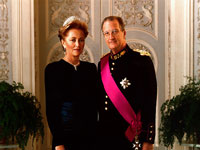Belgian subjects fight for more autonomy
There are more and more talks about splitting Belgium in two, even on Thursday's King's Day, which honors that rare symbol of national unity, the royal family. The country goes without a government 158 days.

When Crown Prince Philippe mounted the steps of St. Michael's Cathedral for a King's Day service, some Flemish separatists leapt close to him, shouting "Belgium be damned" before police took them away, handcuffed.
On Sunday, the "Belgicistes" - those who favor holding the bilingual kingdom together despite bitter its linguistic division - will counterattack with a "March for Unity." They hope to rally thousands to Brussels to support the black, yellow and red tricolor. At the end, they will offer Belgian beer and fries.
Negotiations to form a new government, already at record length, have been stuck for the past week. Bitter accusations have flown across the linguistic border that divides the 6 million Flemish speakers in the north from the 4.5 million French speakers in southern Wallonia and bilingual Brussels, the capital.
On Thursday, Francophone politicians were livid because Flanders had refused to confirm three French-speaking mayors who won elections in Flemish towns bordering the linguistic divide. Last week, they were equally angry when Flemish politicians used their majority in a parliamentary committee to push through a preliminary vote seeking to break up a bilingual electoral district in their favor.
Both moves were "an attack on Francophones, an attack on democracy," said Francophone Liberal coalition negotiator Olivier Maingain Thursday.
"In one week, twice a slap in the face," said his Christian Democrat counterpart Joelle Milquet.
There are fears the developments could set back talks on forming a government, led by Flemish Christian Democrat Yves Leterme, for months.
The surge in linguistic fervor comes after two decades of consensus politics in which disputes were muffled while successive governments concentrated on restoring Belgium's economic health.
But it has become increasingly difficult to keep the two sides united. Flanders, based on its service economy, is thriving, while Wallonia, burdened with rustbelt coal and steel relics, is struggling.
Increasingly. Flanders has balked at sending aid south without getting more autonomy.
Until the June 10 elections that triggered the long stalemate, Belgium had been seen as an example to the world of how different groups could live together peacefully.
That is no longer the case. Karel De Gucht, who continues as foreign minister in the caretaker government of Prime Minister Guy Verhofstadt, has seen the changed perception abroad.
And never more so than when he met his counterpart, Hoshyar Zebari of Iraq, a nation where ethnic strife is far worse than in Belgium.
"Only half joking, he welcomed me with the unforgettable words: 'We understand each other. We have the same problems,' De Gucht wrote in the Belgian daily newspaper, De Standaard. "Understanding and humor, that is perhaps what we lack the most."
Subscribe to Pravda.Ru Telegram channel, Facebook, RSS!


